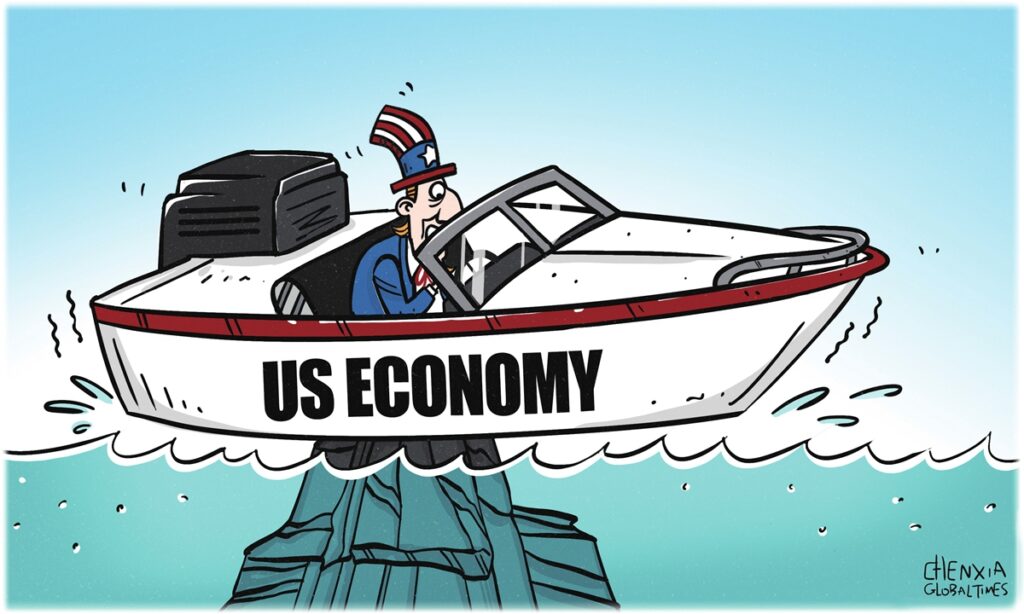While economic indicators and recent turmoil in financial markets may not technically constitute clear signs of a recession, risks in the US economy and its financial markets are building up. These risk factors pose a threat to its own financial stability and that of the world from multiple aspects, calling for greater vigilance among global investors.
JPMorgan Chase CEO Jamie Dimon said on Wednesday that he still believes that the odds of a “soft landing” for the US economy are about 35-40 percent, making a recession the most likely scenario in his mind, CNBC reported.
Dimon noted he is “a little bit of a skeptic” that the Federal Reserve can bring inflation down to its 2 percent target, pointing out that geopolitics, housing, deficits, spending, quantitative tightening and the election all could cause some consternation in markets.
The market was further unsettled by a lackluster $42 billion sale of Treasury debt on Wednesday. US debt is typically regarded as one of the most secure investments globally, so a decrease in demand may indicate concerns about the outlook for the US economy and the level of US government debt.
Judging from the reaction of market players, there is growing concern and talk of a recession in the US. Data released last week showed the US unemployment rate unexpectedly rose to 4.3 percent in July, its highest level since October 2021, triggering the Sahm Rule, which is widely recognized for its simplicity and ability to quickly reflect the onset of a recession.
In particular, the S&P 500 index fell by nearly 3 percent on Monday, the largest single-day decline in nearly two years, further exacerbating investor anxiety.
Capital markets are often the first to react to signals of economic troubles. The recent turbulence in the US stock market, especially the decline of tech stocks, seems to be hinting at some unusual trends. In recent years, the rise in US stocks largely depended on the success of artificial intelligence (AI) concept stocks and prominent tech companies. However, the latest financial reports reveal that these industry leaders have fallen short on the revenue front, fueling market uncertainties regarding the future of the AI sector.
If anything, Warren Buffett’s Berkshire Hathaway’s dumping of its Apple stake may reflect the unspoken market fear of a hard landing for the US economy, the AI industry, which heavily relies on economic prosperity, will also struggle. That’s why signals of a potential recession can more easily drive a tech stock market rout these days.
Some analysts indeed noted that there are no perfect statistical rules for predicting recessions and from all data available, there is still no clear sign of a recession in the US economy. Nevertheless, the growing economic risks are worrying enough, given the multiple challenges facing the US economy, including massive debt, high inflation pressure, and increased global economic uncertainty.
In particular, the US national debt hit a new $35 trillion landmark, while inflation continues to rise, putting significant cost pressures on consumers and businesses. In addition, protectionist policies and wealth disparities in the US are exacerbating inflation pressure, making it difficult for the Federal Reserve to choose between controlling inflation and promoting growth.
Uncertainty over the US economy and the risk of a potential recession are affecting its own market and could set off a ripple effect in global financial markets. Should the US economy suffer a hard landing, export-driven economies like Japan and South Korea would bear the brunt. The extreme volatility in the stock markets of Japan and South Korea over the past week serves as a clear indicator of prevailing market anxieties.
The problems facing the US economy, such as significant debt, mounting inflation, geopolitical instability and other factors, have been laid bare for the international community to see. The interaction of these issues heightens market unpredictability and amplifies the threats to the global economy.
Of particular concern is the potential collapse of the AI bubble, which could escalate market instability and weigh heavily on the global economy, particularly affecting emerging markets and developing nations. In this context, the world needs to be prepared for the consequences of US potential economic troubles.
GT




